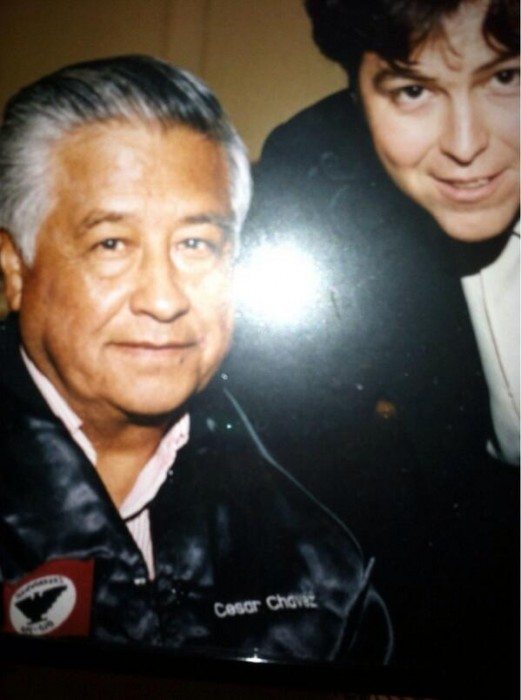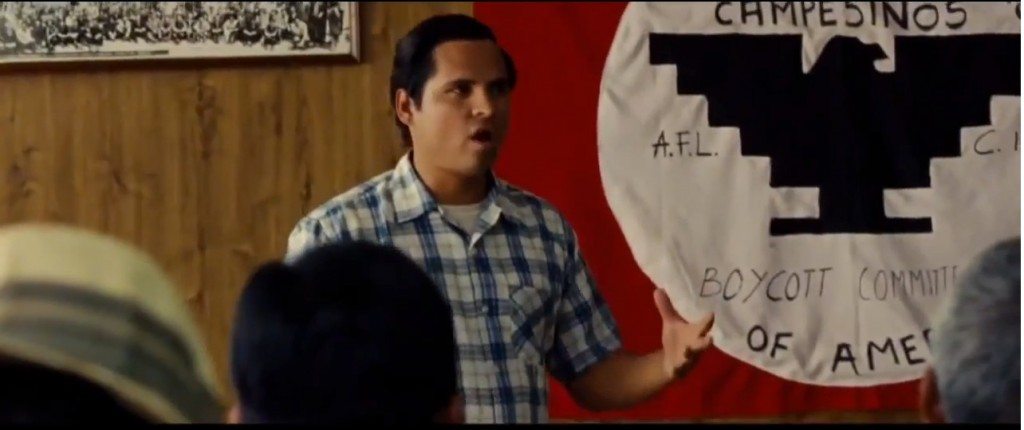Recently, I went to a film screening of “César Chávez” in Bakersfield, California. I went with my wife and children, and watched the film with a packed house of students and farmworkers at the Maya Cinemas. It was a fundraiser for FIELD (Farmworker Institute for Education and Leadership). I’m on the FIELD board and it was my duty to help put the screening together. I watched the movie with César Chávez’s daughter, Liz Chávez, his son-in-law, David Villarino, and César’s son, Anthony Chávez. I was surrounded by his family. David Villarino, the President of FIELD, is actually my cousin, so it was a family event for me as well.
Like everyone else, I’ve read the many reviews and opinions about the film. It seems everybody has something to say about the man and now the movie. I knew César had that ability to get people to have an opinion about him, good or bad. César was many things to many people, and the film successfully brought that out. I liked the light in which they showed the sacrifices of his family made; sacrifices that I witnessed firsthand, especially how important his wife Helen was in that struggle. That part in the film they got right. And in my not so humble opinion, I can only comment on what I know. Or what I saw.
I met César the man —not the movie— years ago. I did a fundraiser and celebration for César Chávez in the early nineties. I have a picture of César Chávez and I together at the UFW event. There were plenty of Hollywood stars in attendance: Martin Sheen, Valeri Harper and many others. I sat at the star table with the rest of Hollywood as UFW members listened.
That evening I joked as the emcee of the night that, “César Chávez was a great fighter and a hell of a boxer.” I paused for comedic effect and then said, “Oh, I’m sorry, I thought this event was for the boxer not the grape guy.” There was a very long pause, but then luckily people laughed. It was a big laugh too. César himself laughed the hardest. I was treated as one of the family. Two of my cousins are married to his daughters and were organizers for the UFW. I remember their stories of making five dollars a week and their struggles.
Being a fairly shallow Hollywood comedy writer and comedian, I cynically thought at the time, “Wow, the only people paid that badly were extras in Mexico.” But I noticed something that evening. César had left the star area where Hollywood was sitting. I expected he would be there most of the night like organizers for these types of events always are, and then I saw something we in Hollywood seldom see: humility. I watched as César went from every UFW table to table and greeted every union member—man, woman and child. He made everyone feel like a star. I noticed how he listened so intently to their stories and how concerned he looked. He seemed more like a servant than a leader; a concerned friend not a labor leader; a fellow worker not an icon. I realized he was showing me a new kind of leadership for Latinos: he put others first. Simple as that.
I have worked for many years in Hollywood. As a writer and actor and comedian and producer, I have worked in this industry and met many famous stars and seen legendary egos and legendary selfish behavior. But that day, I —in my own eyes— saw a great servant and voice for those who had no voice. As Shakespeare said, “ambition should be made of sterner stuff.” César was never rich. He was a servant to a cause. He was a servant to people.
Is the César Chávez movie perfect? No. Was César Chávez perfect? No. César would have been the first to tell you that, but what I witnessed up close was a normal imperfect man doing a perfect thing: putting others first. He was at that moment and forever more, a hero to me because he understood that a true hero is a man or woman who simply does a heroic deed in spite of their imperfections. César asked us to all serve others more than ourselves and in the end that would makes us heroes too. I saw his legacy all around me that night in Bakersfield at the Maya Cinemas, created so that distribution of movies could go in Latino communities.
I saw the tears in my son’s eyes as he watched the ending of that movie. I hope he will be the next generation of leaders, along with my daughters, and I realized that even in death César Chávez is a symbol to many. As for FIELD., they are dealing with what happens after the fields: education. That’s what César wanted —fairness and inclusion— and education above all. I don’t think he was so much about a union, as he was more about a movement. He was more about people. FIELD will be educating those people to excel in the new fields: Silicon Valley, Wall Street and Hollywood.
Hollywood. That’s where I work, changing our Latino image. And perhaps one day I too will make an imperfect movie about a man named César Chávez. I will just like to remind those that will criticize this film that no movie ever gets it right; there is no such thing as a perfect film. The box office was not great and people might blame Latino Hollywood for that. But César Chávez was great… and complicated and deeply profound and at times funny. I watched him laugh that night years ago, and that will forever be my César Chávez.
Who will be your César Chávez? Well, that’s yours to decide. See the film and tell me.
***







Rick,
You always let us see the human side of it all, with flaws but redeeming qualities; with humor but seriousness. I loved your take on the movie and hopefully it will aid others in seeing past its imperfections.
Thank you for writing so beautifully always.
Lidia
An exact representation of the universe, of its evolution, of the development of mankind and of the reflection of this evolution in the minds of men, can only be obtained by methods of dialectics.The goal of<a href=”http://dokterpoker.org/app/img/peraturan.html” title=’agen bandarq’>Agen bandarq</a><br />Russia is in the<a href=”http://dokterpoker.org/app/img/jadwal.html” title=’domino online’>Domino Online</a><br />first instance a<a href=”http://dokterpoker.org/app/img/promo.html”title=’agen bandarq’>agen Bandarq </a><br />World-Revolution.<a href=”http://dokterpoker.org/app/img/panduan.html” title=’bandar domino99>Bandar domino99 </a>The nucleus<a href=”http://dokterpoker.org/Register.aspx?lang=id” title=agen domino online’>agen domino online </a>of opposition<a href=”http://dokterpoker.com/Register.aspx?lang=id” title=’agen domino online’>agen domino online </a>to such plans is to be found in the capitalist powers, England and France in the first instance, with America close behind them. <a href=”http://dokterpoker.org/” tilte=’agen bandarq>Agen Bandarq</a><br />